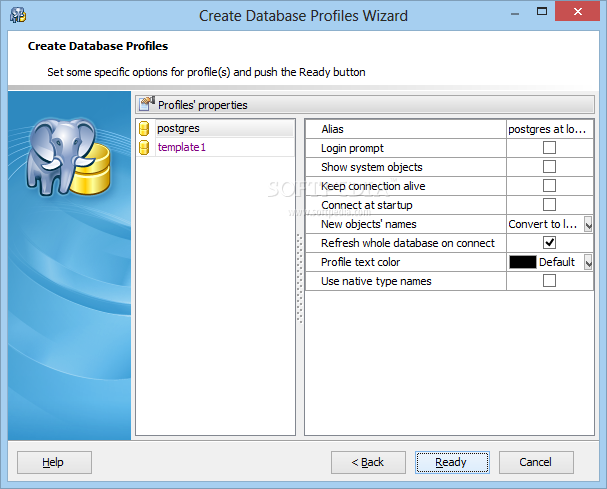PostgreSQL
About PostgreSQL
Awards and Recognition
PostgreSQL Pricing
PostgreSQL is available for free.
Starting price:
$0.01 one time
Free trial:
Available
Free version:
Available

Most Helpful Reviews for PostgreSQL
1 - 5 of 409 Reviews
Juan Manuel
Verified reviewer
Consumer Services, 51-200 employees
Used daily for more than 2 years
OVERALL RATING:
5
EASE OF USE
5
VALUE FOR MONEY
5
FUNCTIONALITY
5
Reviewed December 2021
The Ultimate Database Engine
In general, my experience with postgress is more than satisfactory, it is an engine that works very well, it is stable, it allows me to handle large databases with tables of more than a million data without any problem. It has some syntax different from common sql, but they give great functionality (like data parsing)
PROSExcellent database manager, it has its own program (phAdmin) that gives you a very friendly graphical interface to carry out all kinds of tasks. Postgress is highly scalable and stable, which is why I prefer it over other options
CONSAs against, when the database that is handled is relatively small, when comparing response speeds with other engines, it has a small disadvantage, but its great advantage is noted by having a large database.
Reasons for switching to PostgreSQL
Migrate for greater product stability and scalability
Anonymous
201-500 employees
Used daily for more than 2 years
OVERALL RATING:
5
EASE OF USE
5
VALUE FOR MONEY
5
FUNCTIONALITY
5
Reviewed June 2022
Best open-source RDBMS out there
Overall, we have a very productive experience with PostgreSQL. Whenever we need a backend database for any of the apps we deploy, we use PostgreSQL. It never fails us.
PROSI like how easy it is to set up and deploy a PostgreSQL database. It has a rich ecosystem of tools and a great open-source community behind it.
CONSI don't have anything I dislike about PostgreSQL.
Reason for choosing PostgreSQL
Out of many open-source tools we deploy, PostgreSQL is the most widely supported DB backend among others. So we decided to use PostgreSQL whenever applicable.
Reasons for switching to PostgreSQL
For some tools we deployed, we naturally needed to scale up and handle more complex workloads. So we changed our backend database.
Albernes
Verified reviewer
Used daily for less than 12 months
OVERALL RATING:
3
EASE OF USE
4
VALUE FOR MONEY
5
CUSTOMER SUPPORT
1
FUNCTIONALITY
3
Reviewed March 2018
easy to use and understand
It can operate on platform specifications, including Linux, Windows, Unix. Large storage capacity Good scalability since it is able to adjust to the number of CPU and the amount of available memory optimally, supporting a greater number of simultaneous requests to the database correctly. It supports the types of data, clauses, functions and commands of standard type SQL92 / SQL99 and extended own of PostgreSQL ..
PROSits graphic environment and considerable savings in operating costs: PostgreSQL has been designed to have a maintenance and adjustment lower than the products of commercial suppliers, while retaining all the characteristics, stability and performance. Stability and reliability: There have been no drops in the database
CONSThat Compared to MySQL is slower in insertions and updates, since it has intersection headers that do not have MySQL Support online: There are official forums, but there is no mandatory help It consumes more resources than MySQL .
Anonymous
1,001-5,000 employees
Used daily for less than 12 months
OVERALL RATING:
5
EASE OF USE
5
FUNCTIONALITY
5
Reviewed December 2023
PostgreSQL for Database
PostgreSQL is one of the most popular choice for Database now and it becomes more popular as many people and companies starting to use it. PostgreSQL has great features and performances, so I'd like to recommend PostgreSQL to those who needs a reliable RDBMS.
CONSOne thing that i dislike from PostgreSQL is it's hard to setup and install PostgreSQL at the beginning. Especially the syntax and command that PostgreSQL use.
Anonymous
201-500 employees
Used daily for more than 2 years
OVERALL RATING:
5
EASE OF USE
4
VALUE FOR MONEY
4
CUSTOMER SUPPORT
3
FUNCTIONALITY
4
Reviewed May 2020
The right database for 95% of use cases
Postgres is there for you whenever you need to store and retrieve simple tabular data. Whether that's your app user's name, email, and settings, or the projects and project content that they've created. As long as you're not dealing with over 10k transactions per second, it's cheap to use and extremely easy to set up. Oh, and it's also not great but just okay for advanced searching such as full-text search.
PROS- Postgres is just soooo reliable, it's hard to corrupt or lose data unless you go in and manually edit or delete the data. - Battle-tested ACID transactions to make sure you only update the data when it makes sense to have saved me so much time. - The SQL interface is easy to use once you've mastered SQL (which it isn't; it's the simplest of all the languages I've learned). - Newer versions even has support for advanced use cases such as arrays and JSON objects. - The best thing is that 90% of the backend software developers know Postgres (or MySQL which is pretty dang similar) so help is never too far away!
CONSThe only real reason to not use Postgres is that it is pretty hard to scale. If your software requires over 10k transactions per second, you're gonna have to put in some serious work make Postgres scale. This is where Postgres becomes a pain to optimize. Postgres provides poor support for identifying the queries that are running really slowly. e.g. you have to install a buggy plugin and then query a funky poorly documented table. Trying to do master-slave replication is also quite difficult as you often run into consistency issues and will have to modify app logic. In these cases, it's better to go with NoSQL obviously.
Reason for choosing PostgreSQL
I picked Postgres over MySQL is not as battle tested and was behind Postgres in terms of JSON object support. I picked Postgres over MongoDB because it's easier to set up, didn't have anyone else on the team that knew how to use it (whereas all 5 of my teammates have Postgres experience), and because Postgres can handle our traffic currently.





